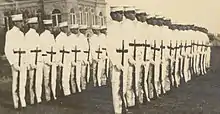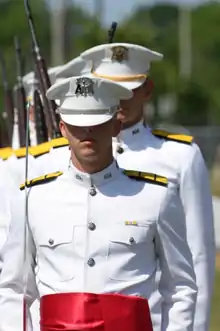Ross Volunteers
The Ross Volunteer Company, commonly known as the Ross Volunteers, is the military escort of the governor of Texas and a unit of the Texas A&M Corps of Cadets.
| Ross Volunteers | |
|---|---|
| Country | |
| Allegiance | |
| Type | Cadets |
| Role | Public duties |
History


Establishment and early history
The Ross Volunteers were established as a military drill team at Texas A&M University in 1887 under the name Scott Volunteers, honoring Col. T.M. Scott, the university's business manager.[1][2] In 1891 the name of the unit was changed to the Ross Volunteers in honor of university president Lawrence Sullivan Ross, and later changed to the Foster Guards, and then the Houston Rifles, reflecting the names of Ross' successors.[2] In 1905 the name was permanently set as the Ross Volunteers.[2]
Later history
The unit was dormant during World War II but was reactivated in 1948.[2] Among its first public engagements following its reconstitution was to escort Governor of Texas Beauford Jester and General Jonathan Wainwright to that year's Texas A&M vs University of Texas football game; the bearing and discipline of the unit was remarked upon by Wainwright.[3] In 1950 the unit was named military escort to the governor of Texas, a role it continues to perform.[4][5][6]
During the state funeral of George H. W. Bush, the Ross Volunteers formed the guard of honor during the removal of the casket from Bush's funeral train upon its arrival in College Station, Texas.[7] The Ross Volunteers are the oldest cadet organization in existence at Texas A&M University, though the now defunct Stephen F. Austin Literary Society and the Calliopean Literary Society were founded earlier.[8]
Uniforms
Since inception, the uniform of the Ross Volunteers has consisted of white trousers and blouses with gold trim, worn with peaked hats.[9][lower-alpha 1] Officers wear a distinctive, crimson waist sash.[9]
Organization
The unit is broken into three platoons based on height. Each platoon is further subdivided into four squads.
Notable personnel
- Andrew Davis Bruce[10]
- Pat Olsen[11]
- Russell Huebner<ref>{{cite web |url=https://www.army.mil/article/177324/in_afghanistan_these_staff_sergeants_are_brothers_in_arms
See also
- 3rd Infantry Regiment
- National Lancers
- Texas Military Forces
Notes
- From 1907-1908 an alternate uniform was worn, and the unit briefly used tin helmets as cover in lieu of peaked hats.[2]
References
- Ivey, Darren (2017). The Ranger Ideal Volume 1: Texas Rangers in the Hall of Fame, 1823-1861. University of North Texas Press. p. 393. ISBN 1574417010.
- Adams, John (2001). Keepers of the Spirit: The Corps of Cadets at Texas A&M University, 1876-2001. Texas A&M University Press. ISBN 1585441260.
- "Ross Volunteers Given Praise by Gen. Wainwright". The Eagle. newspapers.com. December 13, 1948. Retrieved July 3, 2019.
- "Selfless Service". The Battalion. November 26, 2012. Retrieved July 3, 2019.
- Knight, Paul (January 23, 2008). "Rotten to the Corps: A Question of Justice at Texas A&M". Houston Press. Retrieved July 3, 2019.
- "Students killed in bonfire timbers will be remembered in Aggie traditions". CNN. November 19, 1999. Retrieved July 3, 2019.
All students proceed silently to the mall, where the Ross Volunteers, a group of junior and senior cadets who serve as the honor guard to the governor of Texas, fire a 21 gun salute to the fallen students.
- "President Bush arrives in College Station for burial". Austin American Statesman. December 7, 2018. Retrieved December 7, 2018.
- Thomas, Dave (April 25, 2018). "10 things this Aggie didn't know about Texas A&M". Austin American Statesman. Retrieved July 3, 2019.
- "Special Units". tamu.edu. Texas A&M University. Retrieved July 3, 2019.
- Woodall, James (2015). Twelve Texas Aggie War Heroes: From World War I to Vietnam. College Station, Texas: Texas A&M University Press. p. 24. ISBN 1623493196.
- "Who was CE Olson?" (PDF). Texags.com. Retrieved August 28, 2019.